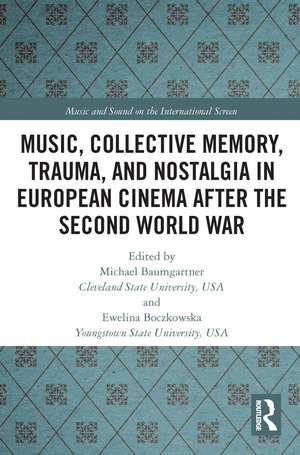Music, Collective Memory, Trauma, and Nostalgia in European Cinema after the Second World War: Music and Sound on the International Screen
Editat de Michael Baumgartner, Ewelina Boczkowskaen Limba Engleză Paperback – 30 iun 2021
Memory is often underrepresented within scholarly musical studies, with most of these applications found in the disciplines of ethnomusicology, popular music studies, music cognition, and psychology and music therapy. Likewise, trauma has mainly been studied in relation to music in only a few historical contexts, while nostalgia has attracted even less academic attention. In three parts, this volume addresses each area of study as it relates to the music of European cinema from 1945 to 1989, applying an interdisciplinary approach to investigate how films use music to negotiate the precarious relationships we maintain with the past. Music, Collective Memory, Trauma, and Nostalgia in European Cinema after the Second World War offers compelling arguments as to what makes music such a powerful medium for memory, trauma and nostalgia.
| Toate formatele și edițiile | Preț | Express |
|---|---|---|
| Paperback (1) | 389.29 lei 6-8 săpt. | |
| Taylor & Francis – 30 iun 2021 | 389.29 lei 6-8 săpt. | |
| Hardback (1) | 1136.91 lei 6-8 săpt. | |
| Taylor & Francis – oct 2019 | 1136.91 lei 6-8 săpt. |
Preț: 389.29 lei
Nou
Puncte Express: 584
Preț estimativ în valută:
74.50€ • 77.31$ • 62.27£
74.50€ • 77.31$ • 62.27£
Carte tipărită la comandă
Livrare economică 15-29 martie
Preluare comenzi: 021 569.72.76
Specificații
ISBN-13: 9781032088990
ISBN-10: 1032088990
Pagini: 322
Dimensiuni: 152 x 229 x 17 mm
Greutate: 0.44 kg
Ediția:1
Editura: Taylor & Francis
Colecția Routledge
Seria Music and Sound on the International Screen
Locul publicării:Oxford, United Kingdom
ISBN-10: 1032088990
Pagini: 322
Dimensiuni: 152 x 229 x 17 mm
Greutate: 0.44 kg
Ediția:1
Editura: Taylor & Francis
Colecția Routledge
Seria Music and Sound on the International Screen
Locul publicării:Oxford, United Kingdom
Public țintă
PostgraduateCuprins
Part I: Collective Memory and (Trans-)Nation / Chapter 1: A Fanfare Floating Beneath Sea Level: Music as a Sonic Lieu de Mémoire of Dutch Cultural Identity on Film (Emile Wennekes) / Chapter 2: Which People’s Music? Witnessing the Popular in the Musicscape of Giuseppe De Santis’s Riso amaro (1949, Bitter Rice (Maurizio Corbella) / Chapter 3: Phantoms of Italian Opera—Cultural Memory in Italian and (West) German Films (Roger Hillman) / Chapter 4: A Bridge Too Far? Music in the British War Film, 1945‒80 (Mervyn Cooke) / Part II: Trauma and Survival / Chapter 5: Hidden in Plain View: The Music of Holocaust Survival in Poland’s First Post-war Feature Film (Barbara Milewski) / Chapter 6: Empathy, Ethics, and Film Music: Alfred Schnittke and Larisa Shepit’ko’s Voskhozhdenie (1977, The Ascent) (Maria Cizmic) / Chapter 7: Fugue States: Music, Memory, and Trauma in Alain Resnais’s Early 1960s Films (Michael Baumgartner and Orlene Denice McMahon) / Chapter 8: Re-Sounding Trauma: Sonic Flashbacks in the Films of Jan Troell (Alexis Luko) / Part III: Nostalgia, and the Impossible Returns Home / Chapter 9: Decomposing Heroism: Rolf Wilhelm’s Music for Radetzkymarsch (1965) (Janina Müller and Tobias Plebuch) / Chapter 10: The Music of Sacrificial Acts: Displacement, Redemption, Beethoven and Verdi in Andrei Tarkovsky’s Nostalghia (1983) (Tobias Pontara) / Chapter 11: "Chopin Meant Everything to Us Then": Chopin Nostalgia in Polish Cinema, 1944–91 (Ewelina Boczkowska) / Chapter 12: Returning Home: Critical Nostalgia and French Cinematic Illusion in the Post-war Musical Films of René Clair and Jean Renoir (Hannah Lewis)
Notă biografică
Michael Baumgartner is Associate Professor of Musicology at Cleveland State University.
Ewelina Boczkowska is Associate Professor of Musicology at Youngstown State University.
Ewelina Boczkowska is Associate Professor of Musicology at Youngstown State University.
Descriere
Exploring one of the most integral elements of the cinematic experience—music—the essays in this volume consider the numerous ways in which post-war European cinema dealt with memory, trauma and nostalgia, showing how the music of these films shaped the representation of the past.


